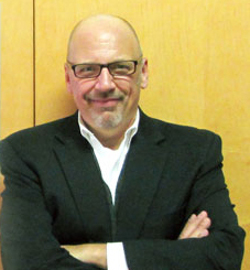
Patrick Yankee, chief development officer for Corktown Health Center
The LGBTQ Community is no stranger to stigma. It infiltrates lives daily, and, sometimes, in cases of life or death, it can be deadly. Dr. Soumya Rangarajan, an internal medicine physician, said that she's seen it take lives firsthand.
"There was a 50-something gentleman who I saw a couple of years ago when I was taking care of him in the intensive care unit. He was a gay male and had been in and out of (care)," Rangarajan said. "He didn't have support or anybody that could take care of him. He comes into the hospital with chest pain, and we don't really have much background on him."
After weeks in the ICU and multiple cardiac arrests, Rangarajan and her colleagues realized that the patient's situation was irreparable. To ensure his quality of life in his final moments, she and her team consulted an ethics committee on how to proceed.
"We finally made him what we call 'Do Not Resuscitate,' and he did pass within a few weeks of coming in," Rangarajan said. "It was a really heartbreaking story because he was from a more conservative state where his family kicked him out when they found out he was gay, and I feel like because of that, he never sought medical care. It just kept advancing and advancing to the point that he ended up coming in with this massive heart attack that ended up ending his life."
Stories like these are why Rangarajan and other medical professionals are highly critical of a new division of the Department of Health and Human Services called Conscience and Religious Freedom. The division just proposed a new rule that would allow medical providers to not give abortion-related services to patients on the grounds of religious or moral objection. However, critics argue that the law's broad language and usage of terms like "sterilization" procedures could be viewed as a direct attack on gender reassignment surgery for transgender people, among other vulnerable populations both in and out of the LGBTQ population.
Patrick Yankee, the chief development officer for Corktown Health Center, an LGBTQ clinic in Detroit, said that this rule legally reaffirms stigma.
"That fear of disclosing something because of how people might react is really alive and well," Yankee said. "I think, with a lot of people who are in the LGBT community and with people who are HIV-positive who are not LGBT, it just reinforces that idea that something is not good about your status."
Corktown Health's Chief Operating Officer Teresa Roscoe agrees.
"I think it opens the door to broader discrimination under the guise of protection for religious beliefs, and, unfortunately, the proposed rule seems to be pretty broad and there doesn't seem to be a lot of limitation about how one could assert that type of a concern," Roscoe said. "From our perspective it appears pretty darn broad."
Rev. Dr. Roland Stringfellow is the senior pastor at MCC Detroit — an LGBTQ congregation. He also takes issue with the rule because of its ambiguity, and because of its potential to do harm.
"I support religious liberty. Where I don't support it is when it encroaches on a life and death situation or peoples' dignity," Stringfellow said. "I think that, even with the Masterpiece bakery case. Some people say, 'Fine, if you don't want to service LGBT people or anyone who you don't care for, then go ahead and put the placard out. Let people know. You should have the right to do that.' People don't want to do that because they don't want to receive the backlash that would surely come from that. My thing is, then you can't have it both ways. If you want to practice this, then tell people up front what this is."
Corktown Health's Medical Director Dr. Latonya Riddle-Jones said that the danger of patients walking into a situation where they expect equal and fair treatment only to be denied, can be far worse than simply avoiding and non-inclusive practice. However, Riddle-Jones said the rule's follow-through to health insurance can be even more insidious than refusing service outright.
"The change that is more alarming to me is that small businesses and employers can decide to provide healthcare insurance that doesn't have all services available to all people," Riddle-Jones said. "I think that is definitely in the direction of really overturning Roe v. Wade. That is their effort in all of these rule changes. There's discrimination when it comes to gender, discrimination when it comes to sex, I feel like we're going back decades right now."
Currently, the proposed rule is scheduled to be published in the Federal Register on Jan. 26, at which point a 60 day period of public commentary will commence before it can be finalized. Comments can be made online on regulations.gov during this time.
The Corktown Health Center expects to see over 800 patients in the coming year. The clinic is located at 1726 Howard St. in Corktown. For more information, call 313-832-3200.










